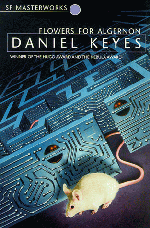| Naše
izdanje
Daniel
Keyes
|
| Cveće
za Aldžernona Daniel Keyes Charlie Gordon is a retarded worker in a bakery, who sweeps
floors, acts as the butt for other's jokes, and struggles to learn
to read under the guidance of Alice Kinnian. His situation takes a
dramatic turn when he undergoes brain surgery designed to help
reorder his brain tissue and to grant him intelligence.
Mr. Keyes does a skillful job of showing us Charlie's meteoric
rise from retardation to universal genius, and his tragic return to
his original state. What we see along the way is that intelligence
without compassion is fruitless. We also get what feels like a very
realistic portrayal of the psychological growth of someone who gets
a kind of accelerated childhood, in which a grown man discovers
through psychotherapy and his own dawning intelligence that he is
filled with repressed impulses and half-understood memories of major
import to his own mental well-being.
Charlie must struggle with feelings of love for his former
teacher, with his sense of abandonment at the hands of his mother,
and with his anger towards a sister who committed seemingly
senseless acts of cruelty against Charlie in their childhood.
At the end, the reader will have to decide if Charlie is better
off than he was at the beginning of the book, and if being a genius
was ultimately worth something of permanent value to him. |
 There
is, of course, little that I can say about this masterful novel that
hasn't already been said. It is a pleasure to read a work that is
part of the genre of science fiction, but that doesn't use the
category as an excuse for sloppy writing or hack-work.
There
is, of course, little that I can say about this masterful novel that
hasn't already been said. It is a pleasure to read a work that is
part of the genre of science fiction, but that doesn't use the
category as an excuse for sloppy writing or hack-work.